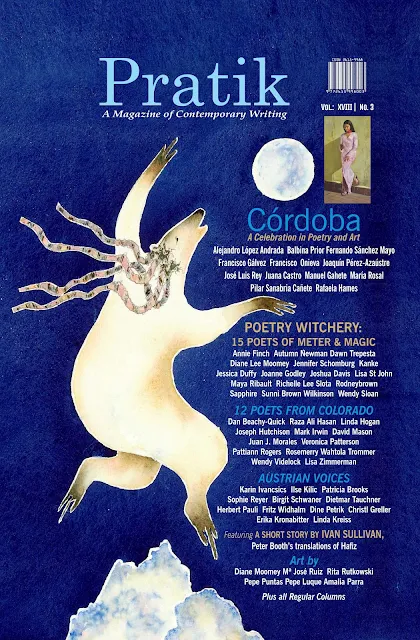ANNIE FINCH
Poetry
Witchery
15 Poets of Meter & Magic
For almost all of the tens of thousands of years of human history, poetry has been structured by strong repeating rhythmical language patterns that act like magical spells, activating our unconscious and conscious minds together and moving us into altered states of consciousness. Healers and shamans, sorcerers and enchantresses, medicine people and witches have used meter to transform consciousness, to heal, and to connect us with the traditions of our ancestors and with the sacred powers of the natural world.
Thalassa by Tanja Thorjussen_2020_watercolor and ink on paper
For forty years, as a witch and a poet, I have been writing, teaching, and performing metrical poetry and ritual to help reclaim this time-honored role for rhythmical language at a time of unprecedented political and environmental crisis. I was delighted when Yuyutsu Sharma invited me to edit for Pratik a special section of poetry by poets who have been exploring poetic meter with me at PoetryWitchCommunity.org and elsewhere. The poets gathered here are drawn to use their poetic skills to reconnect people with our rhythmical legacy and the healing gifts it offers, not only to ourselves, but to the planet of which we are part. By opening themselves to meters, they are embracing a beautiful revolution that points in a hopeful future direction for poetry.
As you read aloud, you will discover that these poems prioritize “metrical diversity”—a range of different meters, each weaving a different mood and energy. In this section you will find poems written in accentual dimeter, accentual tetrameter, accentual pentameter, anapestic tetrameter, iambic dimeter, iambic tetrameter, iambic pentameter, trochaic tetrameter, dactylic trimeter, dactylic tetrameter, and amphibrachic tetrameter, and in forms such as acrostic, ballad stanza, triolet, sonnet, and sapphics. While this metrical range is a significant expansion on the usual metrical vocabulary available in English today (which consists almost entirely of one meter, iambic pentameter!), of course it is still a far cry from the far more immense richness and diversity of meters explored in Hindi and other ancient languages. Yet at least it’s a start towards exploring the power of metrical diversity in English.
Dance of Five Elements by Moomey
Please be sure to read these poems aloud, because meter is a physical art that engages the body as much as the mind. Three times is the ideal number to allow meters to work their magic; as my Twitter hashtag puts it, “#speakitthrice!” As you read aloud, you may hear an impatient voice inside your mind telling you that you already understand the poem and you are wasting your time. I suggest you thank this voice for its concern, but don’t obey it. Allow yourself to take the time to speak the poem thrice, and notice how you feel after that. If speaking aloud is impossible, the poetry can be whispered, or sounded silently in thought. As long as you allow each line to occupy its full physical time, you will still “hear” the meters physically, in real time, like music, in the mind.
Over the decades I have been teaching meter, my teaching has grown so streamlined that now much of what I offer to the poets who study with me is simply permission: permission to allow body, heart, will, and spirit to participate in poetry on a fully equal basis with mind; permission to become curious about meter, scansion, the craft of sound, and the depth of meaning these can convey; permission to experience physical exhilaration and pleasure in the movement of language’s rhythms; permission to allow one’s individual voice to be swept up in the momentum of an activity that predates the memory of written culture; and perhaps most of all, permission to give up the internalized judgments, the fears of being silly or sentimental, which cause so much pain and numbness in the modern world, in order to join fully in the cosmic dance of magic, play, and connection.
I now extend to you,
our dear readers, this same permission. Please: #speakitthrice, and enjoy!
Annie Finch
Brooklyn
May 1, 2023
Educated at Yale and Stanford University, Annie Finch
is the author of seven books of poetry, most recently Earth Days (Nirala,
2023) and The Poetry Witch Little Book of Spells (Wesleyan University
Press). Her poetry has appeared in the New York Times, Poetry Magazine,
and the Penguin Book of Twentieth-Century American Poetry. Her other
works include The Body of Poetry: Essays on Women, Form, and the Poetic
Self, The Ghost of Meter; the poetry-writing guide A Poet’s Craft and
Choice Words, the first international anthology of literature on abortion.
Now
Available on Amazon India, USA, UK & Canada
Amazon India: https://www.amazon.in/dp/B0CBBWYB48?ref=myi_title_dp
Amazon USA: https://www.amazon.com/dp/B0CBL1DZZG?ref=myi_title_dp
Amazon Canada: https://www.amazon.ca/dp/B0CBL1DZZG?ref=myi_title_dp
Amazon UK: https://www.amazon.co.uk/dp/B0CBL1DZZG?ref=myi_title_dp






